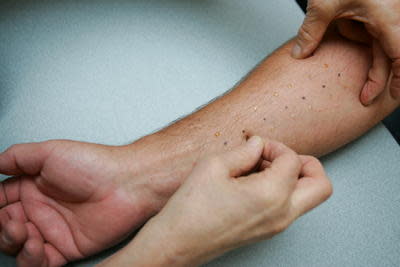What you need to know about this 'worse-than-normal' allergy season
All the rain that the Coachella Valley has been getting recently has been great for blooming wildflowers, but those with allergies might not be as eager to smell the roses anytime soon.
Board-certified allergist/immunologist Vincent Devlin, with Eisenhower Health's Allergy and Immunology Clinic, spoke with The Desert Sun to talk about what allergy sufferers can expect this season.
How does allergy season look so far in the Coachella Valley?
Devlin: While we, Southern Californians, know that we desperately need rain because of the severe drought, the increased amounts of rain over the past few months will allow us to anticipate a worse-than-normal allergy season. We live in an area that has a perennial growing season, meaning things are always blooming. We have more pollen throughout the year. However this year, because of the increased rain and because that activates certain seeds as well as allows other plants to grow, we'll certainly have an increased or overall worse pollen season than previous years when there was less rain. This can affect not only people with allergic rhinitis, but also allergic conjunctivitis as well as allergic asthma.

What symptoms might allergy sufferers experience?
Devlin: Some of the symptoms, particularly for allergic rhinitis sufferers, might include nasal congestion, nasal itch, sneezing, rhinorrhea or runny nose. Some other symptoms may include ocular itch or red eyes, and swelling of the eyelids, which can lead to puffy eyes. Some patients will even have dark circles under their eyes.
Patients who have asthma, a lung condition where people wheeze and have difficulty breathing, can be affected as well, exacerbating their asthma.
Is hospitalization common?
Devlin: If you have asthma, that's who we see in the hospital. Generally, those patients are patients who have an asthma attack that's exacerbated by their poorly controlled allergies. The nose and upper airway are innately connected to the lungs and lower airway.
Rarely do we see patients with just allergic rhinitis or allergic conjunctivitis coming into the hospital. More often they present to their primary care physician or specialty physician, like their allergist immunologist.

What can people do to help alleviate symptoms?
Devlin: Always touch base with your primary care physician or provider to make sure you're consistent with allergies.
There's lots of great over-the-counter remedies. One of those is intranasal corticosteroids, the most popular one is called Flonase nasal spray that decreases inflammation in your nose. Recently, an intranasal antihistamine called Astepro or Azelastine has been approved over-the-counter within the past year. It's similar to an oral antihistamine that you would take, but it works in your nose directly at the site where symptoms are occurring. There's also oral antihistamines. I always suggest a second-generation oral antihistamine, so that's a Zyrtec, Claritin, Allegra or Xyzal. Those medications won't make you feel like some of the first-generation antihistamines such as Benadryl.
If you are interested in a non-medicine treatment, there are sinus rinses, like a neti pot.
Improving the air quality in your home is obviously a great first step, whether you have allergies or not, so making sure those HVAC filters are changed regularly. Once you have identified the allergens through testing, then you can make some more specific interventions in the home. If you're allergic to cats and you have a cat, there are things we can do, same with dust mites.
Generally for patients who are suffering this time of year with pollen allergies, the pollen counts are typically highest in the morning, so staying inside during the morning time if you can is always beneficial. If you have to be outside and you are having those symptoms from pollen allergies, take a shower to remove the excess pollen off of yourself and do a clothing change as well.

What types of resources are available at Eisenhower Health's Allergy and Immunology Clinic?
Devlin: We connect them with medication. Some of those medications are prescription and some are over the counter. We also do allergy testing, which is called a scratch test or percutaneous test. That testing helps to inform us what the patient may be allergic to which helps to anticipate what time of year they may have symptoms, if there's anything in the home that they may be able to remediate to minimize their symptoms.
There's also a type of treatment called allergy shots or allergen immunotherapy, which are shots that add a little bit of aeroallergen or pollen in them. These shots allow the patients to be desensitized to whatever they are allergic to in the environment, allowing for less severe symptoms, less frequent symptoms, less need for medication, fewer sinus infections as well as just overall improved quality of life.
Traditionally with these shots, you come in once or twice a week over months at a time to build up to that maintenance dose and then continue for three to five years at a monthly dose. We also do accelerated immunotherapy as well where we fit about four months of shots into a single day. That kind of immunotherapy very few people in Southern California offer, so that's an exciting treatment option that we have here in the Coachella Valley.
Ema Sasic covers entertainment and health in the Coachella Valley. Reach her at ema.sasic@desertsun.com or on Twitter @ema_sasic.
This article originally appeared on Palm Springs Desert Sun: What you need to know about this 'worse-than-normal' allergy season

